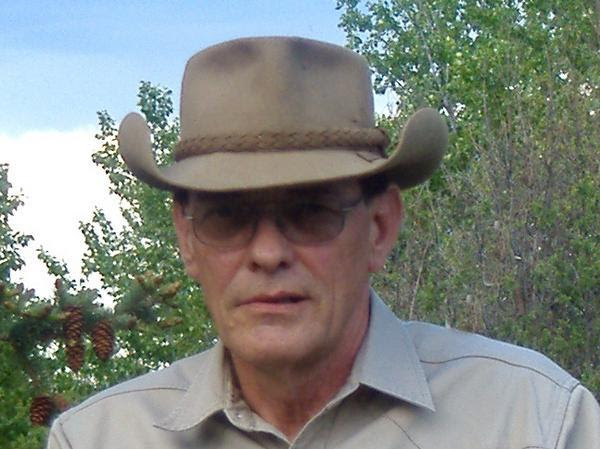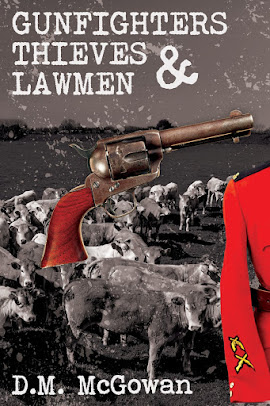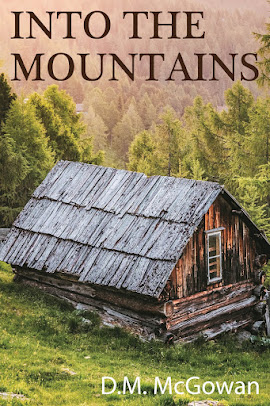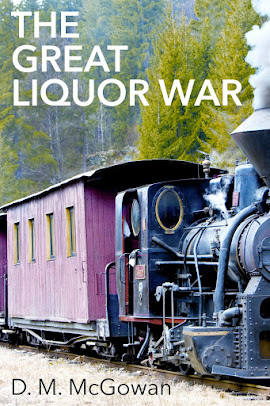Historical Notes
During the novel “The Making of Jake McTavish” there is a part where Jake visits what is now called by the locals the “Old Fort” and speaks with a young man I actually knew 60 years later. Here is a picture of the old Roman Catholic Church at that site roughly 20 years after the time depicted in the story.
Jake also talks to a young North West Mounted Police officer who was the single remainder of a large troupe who went through the Peace Country that year, details of which are covered in the “Author’s Notes” at the end of the novel. However, one of the things the troupe did before continuing on was to build the NWMP post and jail on the south side of the river which still existed there (although it had been turned over the the BC Provincial Police about 1909) when I worked on the ranch which surrounded it. It was however in better shape when I worked there in 1963 and has since been moved and restored at the Fort St. John museum.
The second picture is how it appeared in 1929
An Excerpt from "The Making of Jake McTavish"
1
Jake McTavish came out of the winter twenty pounds
lighter and a whole lot meaner. Perhaps not meaner than he had been the fall
before but definitely more than he had been before his wife had been murdered.
That had been slightly more than four years in the past but he had not
forgotten anything about it. The more he brooded here in the wilderness the
more he detested the company of his fellow man.
That meant it was his fourth year taking furs from
He was leaning against the door frame of his cabin,
morning coffee in hand, gazing down toward the river, when he said, “Maybe I’ll
just have t’ shoot somebody. That way the government will have t’ feed us ‘til
they punch my ticket and bury me.”
Jake wasn’t paying much attention to what he was
saying. The words were just noise to fill the empty cabin; and his only
companion, the blue tick hound on the floor by the stove, always agreed with
him.
After four years of talking to few but the hound Jake
was beginning to think the animal understood. Having experienced the
intelligence of the animal he had also begun believing he knew what the dog was
thinking.
“Yeah, I know, problem with that is we’d have t’ find
somebody to shoot,” Jake continued, and then added, “
If Jake had been serious about shooting someone,
perhaps he would have paid more attention to his surroundings. Had he done so,
he might have saved himself from an attack on his life. However he did notice
the hound briefly lift one eyelid and quickly let it close. Another person
viewing his always serious expression probably wouldn’t have believed it but
Jake foundChester’s reaction humorous. They had been out before dawn checking
the few trap sets still near the cabin. The mornings were still cold and Jake
was sure
Jake spent the rest of the day closing up camp. He had
already tripped any open traps that morning and only had four fresh hides -
three beaver and a martin - to set out on drying frames. The few supplies that
had managed to make it through the winter he put up in his cache cabin - a
solid tree house built high between two pine trees. He gave his canoe a very
careful check for damage and placed it in the water, tied securely to the log
dock.
He decided to take the fresh hides laced in their
drying frames by setting them on the three small bales of furs he would load in
the canoe. It was precarious, considering some of the white water he would have
to shoot, but he could tie them in place. The alternative was to leave them to
be included in next years take, but he thought he needed everything he could
get this year. Besides, if he left them he would probably find them ripped up
by coyotes or wolves when he returned. Leaving them in the cabin or cache would
fill those structures with enough stink to attract a grizzly. Given enough
incentive a silver tip would break into anything.
The first part of the trip went as Jake had planned;
and since it was his fourth trip down to
Some stretches of river did create heart pounding
moments. Jake was not one to admit it, even to himself, but adrenaline flowed
and he worked hard to avoid rocks and whirlpools.
There was just enough light for Jake to shoot the last
rapids on the Finlay, and enough dark that he could steer wide around the
settlement of Finlay Forks without attracting attention. Everyone stopped at
the landing. After a winter in the bush most men wanted company and
conversation. Jake wanted neither. He also didn’t want to put up with fur
traders trying to deal him out of his pelts for less than top price.
***
Two men did see him from the dock as he turned into
the
In the twilight Sam Twice made a flicking motion with
one finger toward the silhouette out on the water. “Him maybe got fur,” he
said.
“I expect he does,” Martin agreed. He took a swig from
the jug he held and passed it to Sam. “Perhaps he also has a small poke of gold
he’s panned out of streams.”
“Why him not come in?” Sam asked. He flicked a finger
toward the large cabin that served as store, saloon, and hotel as long as one
wasn’t too particular about prices, liquor quality, or sleeping on the floor.
He took a swig from the jug which the two had purchased at the store. Sam
didn’t care about the quality of the refreshment since he had never had
anything better.
“I expect he wants more than half price for his
pelts,” Martin replied. “He’ll take them down to
“Don’ like that man boss that
Martin looked at Sam a moment. He knew there was much
about Sam’s past that he didn’t know, but he didn’t really care. Sam was useful
from time to time, and that was all the mattered. “I heard his wife was Cree,
but what do I know? I’ve never even seen the woman.”
Sam grunted, giving Martin no idea what he meant.
Martin waved toward the silhouette of man and canoe
fading into the gathering darkness. “Now, that pilgrim will undoubtedly stop
for the night. Tomorrow he’ll go on to
“I like maybe stay here an’ drink,” Sam objected. He
wasn’t one to hasten toward any effort that wasn’t absolutely necessary.
“How would you like to have a nice canoe?” Martin
asked.
Sam looked at Martin with hard, cold eyes. “I get
canoe an’ you get fur?”
“No, no,” Martin objected. “We split the furs and you
get the canoe. After all, I already have a canoe.”
Sam nodded several times, then placed the cork in the
jug and hit it with the heel of his hand. “We go.”
2
There was no question about pulling out of the water
upriver from
It was mid afternoon of their second day of travel
when Jake pulled in to the river bank.
Pulling the canoe up so the current couldn’t take it,
Jake said, “Mighty fine idea,
Jake unloaded his canoe and dragged the craft up onto
dry ground.
“We ain’t in a hurry,
At the start and end of any portage there are
well-used camp areas; and if the trail to more water is long enough, more
stopping places along the way. The PortageMountain trail - a long walk without carrying a pack - was no exception.
There were several sites that had been used on the upriver end. Jake chose one
of the spots as far back as possible from the trail end and riverbank and
started his fire. If there were other travellers, he wanted to avoid company if
possible. He didn’t mind carrying a little water.
While the fire burned down to coals he moved his
freight and canoe up to the camp site. Gathering firewood, he noticed a small
aspen sapling and cut it with his knife. Back at the fire he skewered a piece
of moose meat with the green stick and drove the butt end of the stick into the
ground so the meat was suspended over the coals.
As the meat was heating up to a sizzle he mixed up
some bannock batter, wound it around another piece of green stick and propped
that over the fire.
“You’re getting lazy, old man,” Jake said. “First
smell o’ cookin’ meat an’ you come back.”
He turned his gaze to the hound and saw the relaxed,
satisfied look and the long tongue licking lips.
“I apologise, old man. I don’t know what you mighta
found t’ eat on this pile o’ rocks, but you’ve found somethin’.”
When he finished eating and washing up, Jake threw a
couple of sticks on the fire and propped the canoe up so it would collect and
hold the heat for his bed. He propped himself up against a dry log, loaded his
pipe and leaned back puffing contentedly.
“Nothin’ wrong with this, Ches. Nice warm night.”
Surprised at his master’s good mood, Chestergrunted.
During breakfast the next morning Jake decided to
continue taking it easy. Even though the two bundles of furs were not very
large he would pack them around the mountain one at a time. The four fresh
plews had not been properly treated, but they were dry so he decided to tie
them on to one of the bundles. He pulled a bag full of string and sinew from
his possibles pack and wrapped the hides in place, cutting the ends of sinew
off and putting them back in the bag.
He was already on the trail when he realized he hadn’t
put his knife back in the sheath. He hesitated, decided he would pick it up on
the next trip, and started off again.
He had only taken a few steps when he heardChester off the trail to his right. There was
the beginning of a bark followed by a howl that was abruptly cut off. Jake
swung the pack of furs from his shoulders, dropped it to the trail, and stepped
into the brush.
There was blinding pain from the back of his skull. He
saw a light as bright as the sun. Then he fell into blackness.
























